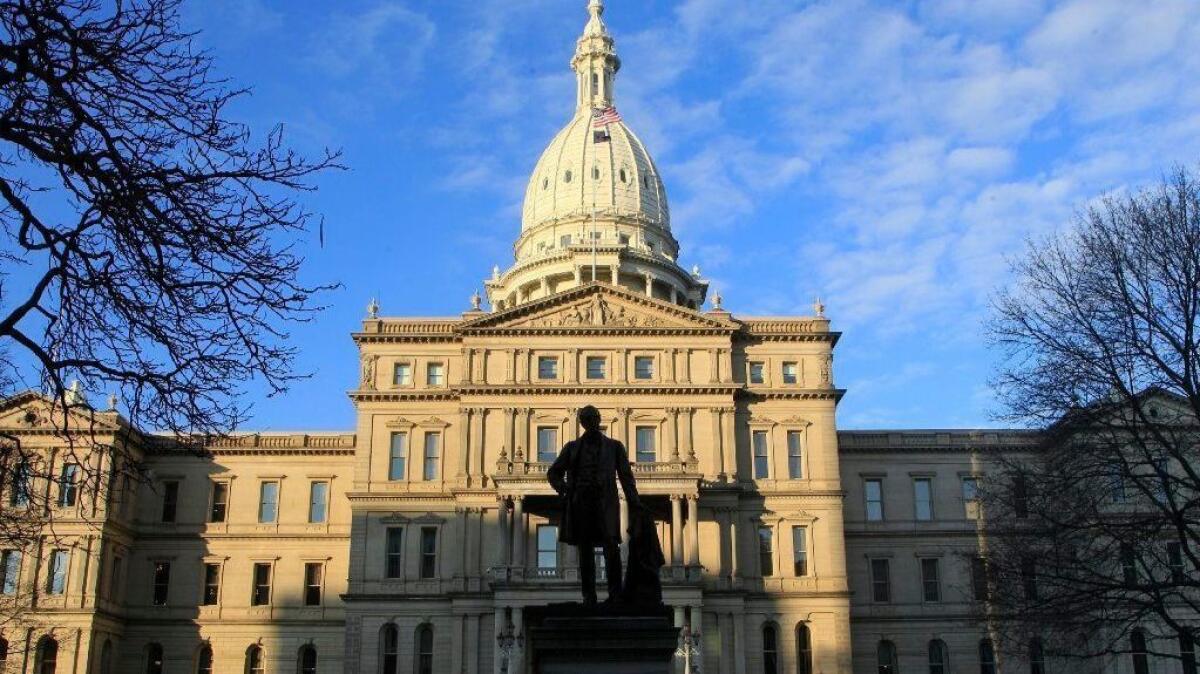A blue wave’s biggest impact could be in the state legislatures

Even as voters fixate on the fight for control of Congress, that other battle going on this election cycle — the one for power in the states — could prove most dramatic for the direction of the nation.
Democrats anticipate significant wins, retaking majority control of as many as a dozen state legislative chambers. If that happens, it would shake up the political order from coast to coast.
Since the early years of the Obama administration, Democrats suffered historic losses at the state level. That enabled the GOP to transform many state capitals into incubators for conservative ideology and policies. The legislative chambers have deeply cut spending, weakened organized labor and loosened gun safety laws. They have resisted action on climate change, curbed abortion rights and worked to unravel Obamacare, with many refusing federal money to expand Medicaid.
If election forecasts hold, those conservative efforts will be stymied in many places when the next class of state lawmakers assume their seats.
Moreover, Democrats appear to be positioned to gain full control over the governments of a few key states, including Colorado and New York, where power is currently split. Those states could join places like California in advancing liberal policies and more robustly challenging the Trump administration.
In other states, voters seem poised to bolster the power of Democratic governors by ending veto-proof legislative majorities Republicans hold.
“These elections are huge,” said Tim Storey, elections analyst at the National Conference of State Legislators. “Eighty percent of the seats are up …Democrats are optimistic that they can pick up eight to 12 chambers and make substantial gains in others.”
In some of those states, including Wisconsin and Maine, Republicans are also in danger of losing governors’ offices they have held for at least the last eight years.
The shift in power in the states comes as lawmakers prepare to redraw political districts nationwide after the 2020 Census. Victories this year would help position Democrats to erase many of the heavily gerrymandered districts that the Republicans have used to solidify their hold on Congress and state legislatures since 2010.
The existing voting districts benefit Republicans so much — and voters in some states have migrated so far from the Democratic Party — that even if the blue wave Democrats hope for builds into a tsunami, nobody projects that Democrats this year will get back the level of state power they had before the Obama era.
In the 2010 elections alone, 24 chambers flipped to Republican control, more than double the number Democrats are forecast to gain this year. The GOP kept building on those gains, flipping another 11 chambers in 2014.
“This is not going to be the flip side of 2010,” said Carl Klarner, a former Indiana State University professor who forecasts state elections. Despite all the voter intensity, he said, “there are all kinds of places Democrats cannot win because Republicans have built in dikes” through redistricting. In some states, however, such as Michigan, the gerrymanders have been so heavy-handed and awkward that “those dikes could break,” he said.
Voters’ partisan attitudes are more likely to drive how people cast ballots for state legislative candidates than most other offices, political scientists say, since most voters can’t name their state representatives.
“These are not referendums on what state legislators do themselves,” said Steven Rogers, who teaches political science at St. Louis University. “They are dominated by national politics.”
In some states, the fights have become so intense and the stakes so high that the campaigns resemble those run by national candidates. Big corporate interests and Washington advocacy groups are pouring in cash. Progressive advocacy groups are taking a page from the right by engaging grassroots activists at unprecedented levels for down-ballot races.
The Democratic Legislative Campaign Committee has identified 17 seats nationwide that are key to flipping eight legislative chambers. Republicans hold razor-thin majorities in legislative chambers in Colorado, Minnesota, Maine, New York and Wisconsin.
In Florida, Arizona and Michigan, voter enthusiasm for Democrats at the top of the ballot could help the party make considerable gains that may not lead to chambers flipping now, but that could lay groundwork for another surge in 2020. The party is investing $35 million in the effort, the most it ever has on legislative races.
Voters are getting besieged.
“I’ve seen ads broadcast on network television for candidates in three different state Senate races,” said Robert Duffy, a political science professor at Colorado State University. “I can’t recall ever seeing that before. That is a lot of money.”
Democrats are making a big push to regain control of the Colorado Senate, which could be accomplished by flipping a single seat. Several districts in the metropolitan Denver area seem ripe for Democrats to pick, Duffy said. The star Democratic candidates are pulling in endorsements from the likes of former Vice President Joe Biden and they are getting help from national progressive groups such as MoveOn and End Citizens United.
One of the beneficiaries is Democratic Senate candidate Faith Winter, who is in a race in which the Denver Post projected spending will surpass $1 million, most of it for her. This for a job that pays an annual salary of $30,000.
Oil and gas companies are spending big on an independent campaign to persuade voters to back Republicans, as they scramble to keep the party in control of a legislative chamber that has scuttled environmental policies that the companies argue would hurt business.
“We are running the largest down-ballot program we have ever had,” said Lisa Changadveja, the state and local elections director at MoveOn. The effort involves mobilizing the 1,900 MoveOn activists who live in Winter’s district to knock on doors, blast out texts and dig into their wallets for her. The group is doing the same with its members in dozens of other statehouse races.
Another Democratic group applying to state races some of the sophisticated tools more commonly associated with federal campaigns is Flippable. It emerged in 2016 after a couple of campaign operatives for Hillary Clinton in Ohio saw how the lack of infrastructure for down-ballot candidates was fatal even in districts Clinton won.
“We saw the party’s disinvestment in state races play out when working in these field offices,” said Catherine Vaughan, a Flippable co-founder. “Candidates running for state House and state Senate were not getting the resources they needed.”
The group has drawn donor attention to state races by emphasizing the power state legislatures have over gerrymandering. Some 800 of the state lawmakers elected next week will be directly involved in the next redistricting.
Flippable navigates all the thorny and conflicting state finance rules for donors by setting up a network of political action committees that conform to each state’s laws and routing donor contributions through them. Donors don’t need to exhaustively research candidates and figure out where their dollars can have the most impact; Flippable handles it.
But more important for Democrats than a savvy digital operation are candidates with a pulse.
In recent years, Democrats could not manage to field credible nominees in many red-state races. That changed with Trump’s election. The party, which has flipped 44 state legislative seats nationwide in elections that came after Trump’s victory, is contesting more seats next week than it has in any election since 1982. It is fielding candidates in hundreds more of the 6,066 state legislative elections that will take place Tuesday than are Republicans.
“Having a near record number of candidates is going to be good for them,” said Rogers. “You can’t win if you don’t show up.”
The latest look at the Trump administration and the rest of Washington »
More stories from Evan Halper »
evan.halper@latimes.com | Twitter: @evanhalper
More to Read
Get the L.A. Times Politics newsletter
Deeply reported insights into legislation, politics and policy from Sacramento, Washington and beyond. In your inbox three times per week.
You may occasionally receive promotional content from the Los Angeles Times.











